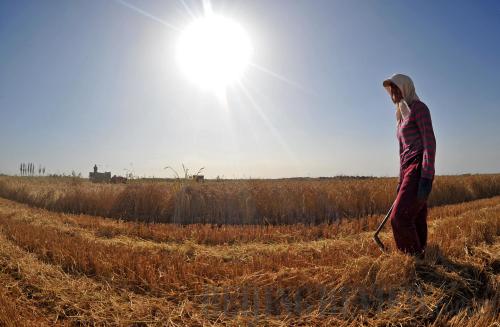| September's bai lu, or "white dew," marks the start of clear and crisp autumn weather and the end of summer heat. Temperatures drop sharply, and in the cool winds, farmers harvest the fruits of their spring planting and planning. Now that the weather is cool and dry, it's high time to prevent dryness. According to the basic health principles of traditional Chinese medicine (TCM), yang energy should be cultivated in spring and summer, and yin energy should be nourished in autumn and winter. TCM offers ways of replenishing yin and nourishing the body to store energy and prepare for the coming season. |
|
 |
|
GOLDEN DAYS: A busy harvest season (WANG PENG) |
Solar Term 15: White Dew (Bai Lu)
Gregorian date: September 7 or 8
Lunar date: Early in the 8th month
In most parts of China during this period, the weather becomes cooler and temperatures decrease dramatically. At night, vapor in the air chills, condensing on trees and flowers as droplets. Hence the name bai lu, or "white dew."
Bai lu is a rush harvest period for farmers, particularly in south China. "If it rains during bai lu, there will be no rice sold in the market," goes the proverb. In the middle and lower reaches of the Yellow River, farmers begin to plant winter wheat, and the majority of autumn crops such as garlic, broad bean, cabbage and carrot should also be planted in the ground at this time.
In east China's Zhejiang Province, there's a saying that, "At chu shu one plants buckwheat, at bai lu one plants vegetables. Grass seeds need the water of the eighth lunar month. [By] the ninth month, it's [too] late."
According to TCM's five elements theory, autumn corresponds with the body's pulmonary system, which involves the skin, respiration, metabolism, blood circulation and immunity. It's best to eat more sour foods while reducing pungent elements during the season. Foods like onion, ginger and peppers give rise to perspiration, and sour foods such as pineapple, apple, grape and lemon prevent the loss of bodily fluids.
|